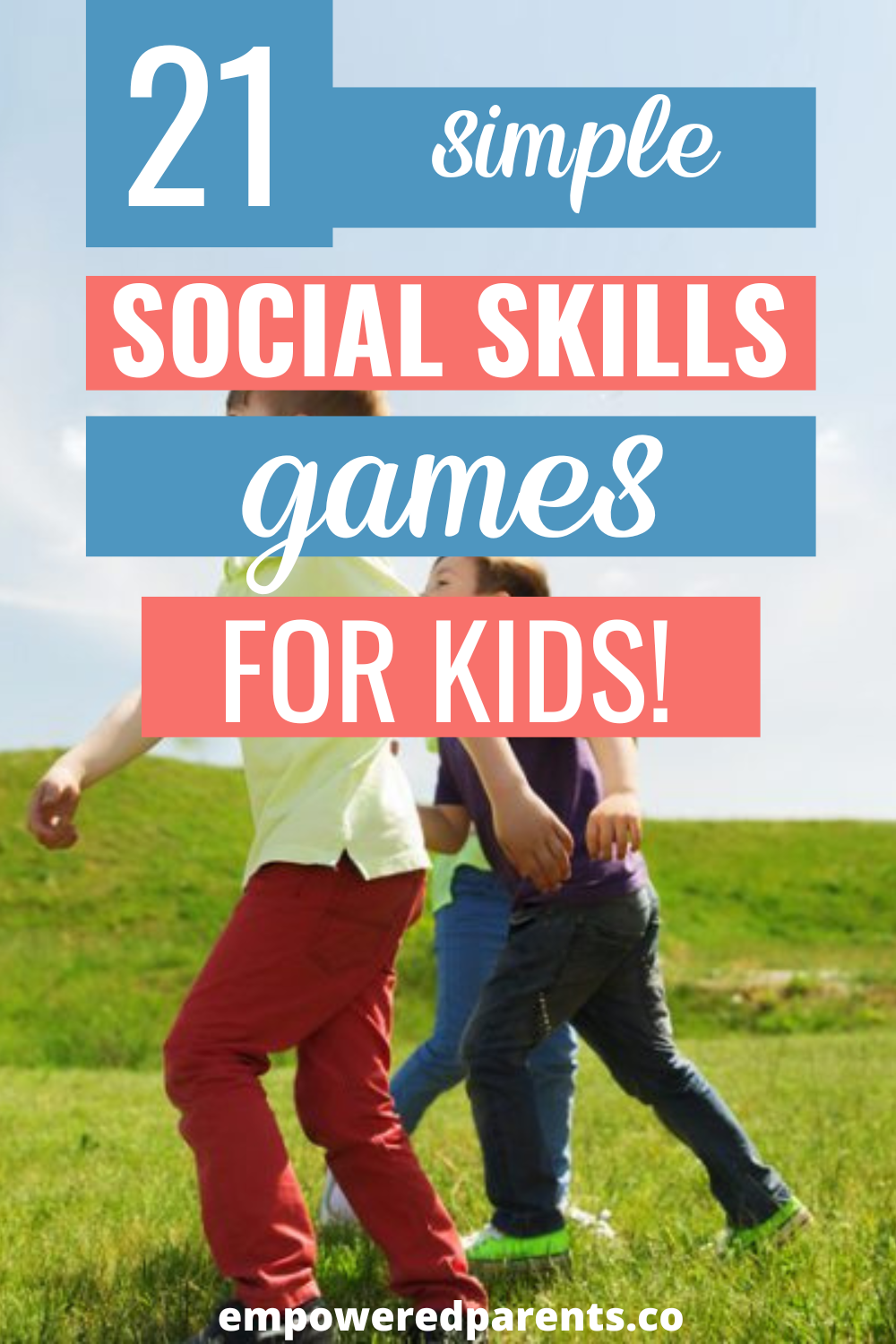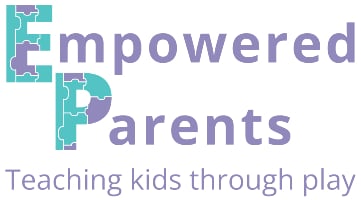Building healthy relationships, positive social behaviours and communication skills is an important part of a child’s social development. As with most skills acquired in early childhood, the most natural way to develop them is through play.
There are many social benefits of play, and playing cooperative games can help develop important social skills such as:
- Taking turns
- Listening to others
- Solving problems
- Being considerate
- Cooperating
- Sharing
- Compromising
- Negotiating
- Leading and following
- Participating in a group
- Winning and losing gracefully
- Following basic rules
- Resolving conflicts
Here are 21 simple social skills games. Many of them are group games and some can be played in a pair. They are suitable for the home and the classroom.
(P.S. There’s a printable at the end of the post!)
1. Hide and Seek
In the traditional preschool game Hide and Seek, one child counts to 10 slowly while the rest of the group finds a place to hide. The child who is “on” then searches for the other children.
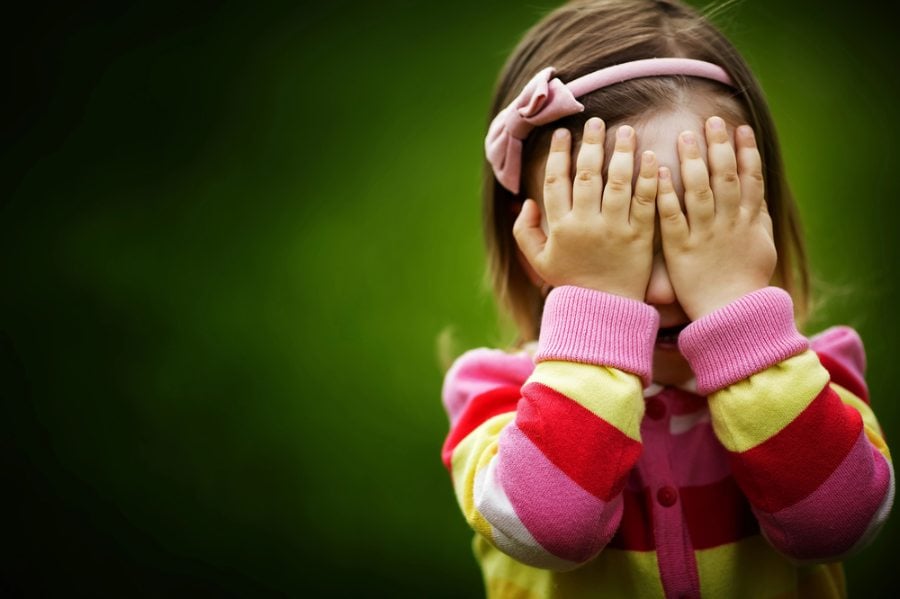
Once a child is found, they can join the seeker in searching for the remainder of the children. The last child to be found can be the seeker in the next round.
This game is a great way to introduce children to the concept of playing a game with rules.
2. Simon Says
Playing Simon Says is a fun way of teaching kids to be active listeners, follow instructions and take turns.
One child is chosen to be Simon and must give commands beginning with “Simon says” which the rest of the group must follow.
A few examples of Simon Says commands:
- Simon says turn around
- Simon says raise your hands above your head
- Simon says balance on one leg
- Simon says smile at someone near you
3. Musical Chairs
In Musical Chairs, the children dance to the music and must run and find a chair to sit on when the music stops. One chair is removed in each round so that one person will not have a chair to sit on and will sit out until the next game.
In this classic game, kids have to learn to navigate around each other and share the space in the room. They have to try not to get upset if they don’t find a chair and also be able to lose gracefully.
The adult guiding the game can help explain to them that some games are played just for fun and that losing is just a part of the game and we shouldn’t take it too seriously.
4. Emotion Charades
Charades is a great game for teaching children to read facial expressions and body language, which is an important aspect of social interactions.
They can learn to recognize and understand different emotions by taking turns to act out various emotions and having the rest of the group guess what the emotions are.
5. Animal Charades
Make simple cards with pictures of animals on and children take turns choosing a random card and acting out the animal on their card.
This game promotes creativity and teaches children to communicate and understand non-verbal cues.
6. Who’s Got the Button?
Playing the game Button, Button, Who’s Got the Button is all about reading expressions and trying to guess who is hiding a button in their hands.
The children sit in a circle with their hands out – palms together – and the adult goes around the circle, pretending to drop a button into each child’s hands, but only dropping it into one child’s hands.
Each child then takes a turn to guess who has the button.
7. Tag
Tag – also called Catchers – is a chasing game that young children love to play different variations of. The simplest version involves one child being the chaser and tagging others by touching them. The person who is tagged becomes the new chaser.

Simple games like this can teach children to follow rules and play in a group, preparing them for participating in team sports. They also learn to share a space while running around, taking care not to bump into each other.
In a game like Chain Tag, which is a variation of Tag, as players are tagged they join hands with the taggers and move together as a “chain” to tag other players. This requires a high level of cooperation.
8. Stuck in the Mud
Stuck in the Mud is another chasing game similar to Tag, that has a wonderful social aspect and fosters positive relationships. Children have to be considerate of others and cooperate to free each other when they are tagged.
To play, one child is “on” and tags the other players by touching them. If they are tagged, they must freeze in position and pretend to be stuck in the mud. They can only be released by another free player crawling through their legs, thus freeing them to run around again.
9. Beanbag Toss
Set up a target, such as a laundry basket, box or cornhole board, and have the children take turns tossing beanbags.
This game encourages kids to take turns, share and be patient, especially if there are limited beanbags.
10. Telephone
Being able to listen is an important life skill for kids to learn, and they can practise this skill with fun games.
The Telephone Game, or Broken Telephone, is a listening game that requires children to pass a whispered message around a circle while attempting to not distort the message.
Here are a few examples of Telephone Game phrases:
- Blue bubbles in the bath
- Peanut butter and jelly
- Salt and pepper
- The king can sing
- The cat is on the mat
11. Storytelling Circle
Seat children in a circle and tell a collaborative story. The adult starts the story and each child adds a sentence or plot line, taking the story in any direction they choose.
This type of language game fosters creativity, cooperation, listening and taking turns. Kids can build social-emotional skills through telling the story of fictional characters.
12. Catch
Playing a simple game of catch and throw teaches children to collaborate as they have to concentrate on throwing the ball with the correct amount of force and in the right direction, in order for their partner to catch it.
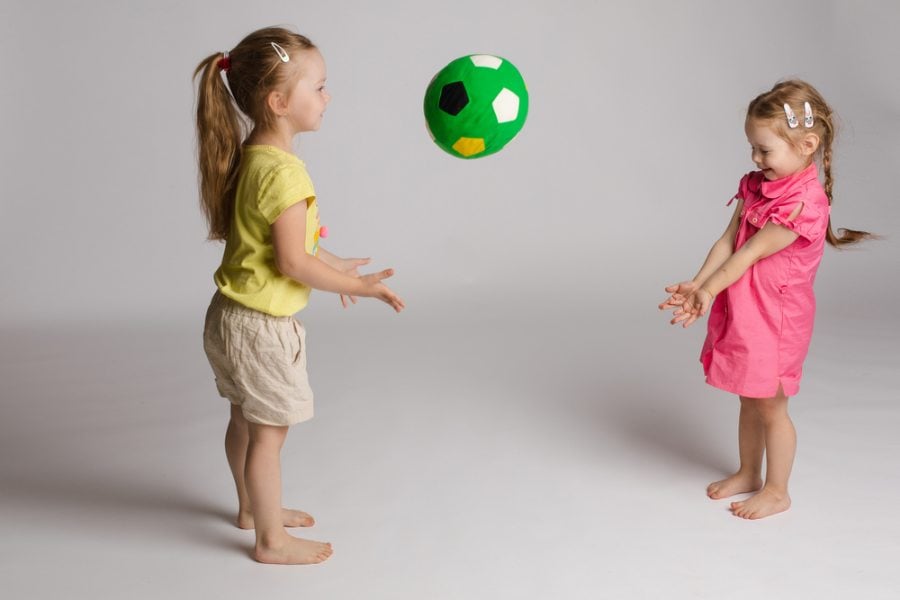
This can also be played with a group of children standing in a circle.
13. Jump Rope
Play a game of Jump Rope where two children hold the rope on either end and swing it, and a third child jumps over the moving rope.
This will require a lot of coordination and working together and can be challenging for younger kids.
14. Friendship Tower
Provide building blocks and challenge children to work together to build a friendship tower. They must take turns adding one block at a time, communicating and collaborating to build a group structure that represents their shared effort.
15. Copycat
Copycat is a fun variation of Follow the Leader but requires that children guess who the leader is.
Children sit in a circle and one child is sent out of the room. That child will have to guess who the leader is. Choose one child in the circle to be the leader and call the “guesser” back inside.
The leader then performs actions that the whole group copies, while the guesser tries to figure out who is leading all the actions.
If the guesser gets it right, the leader then becomes the guesser in the next round and a new leader is chosen.
16. Hopscotch
Play a game of Hopscotch to teach kids to take turns. They can play the traditional rules of Hopscotch or, if playing with young children, they can simply take turns hopping to the end of the court.
17. Role-Playing
Imaginative play is one of the best ways for children to act out and practise social skills in different social situations and scenarios. It helps them to understand the feelings of others as they pretend play at being other characters and trying out different roles.
A few role-play ideas are:
- Serving at a restaurant
- Doctor and patient
- Playing shop
- Being a mom and dad, or family
- Working in an office
- Driving a bus or train
Encourage these games by laying out simple props and dress-up clothes and giving children lots of time for free play.
18. Tic Tac Toe
Draw a simple Tic Tac Toe board with chalk outside or on a piece of paper. Playing in pairs, kids take turns adding an O or an X to the grid (each child is assigned either the Os or the Xs) in an attempt to make a row of three.
19. Dominoes
Dominoes can be played in pairs or small groups. While there are standard rules, preschoolers can simply take turns adding a tile to the row with a matching number of dots on it.
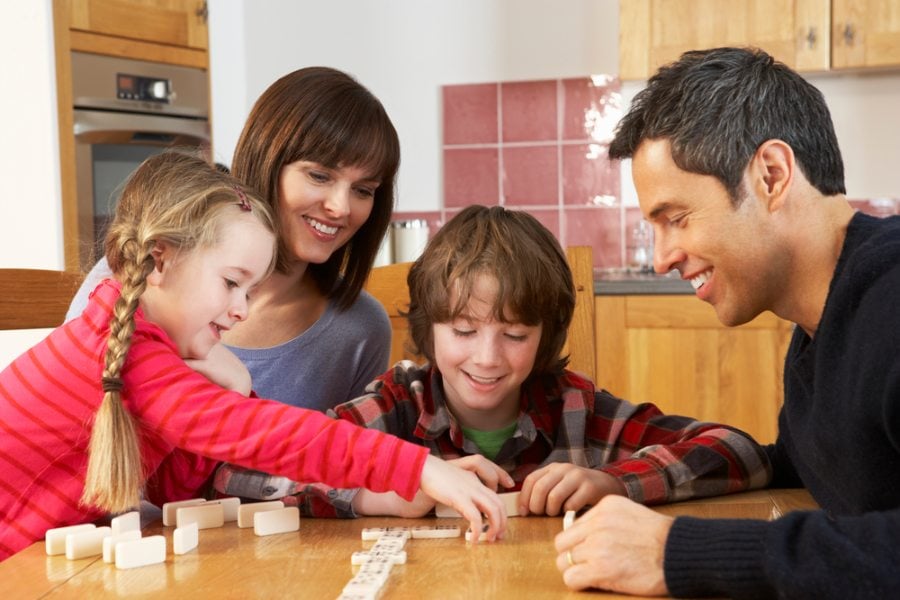
Another way to play with Dominoes and build social skills at the same time is to get kids to work together standing the tiles up in a long row. Once it’s ready, push over the first tile and watch the entire row collapse.
This requires close collaboration as the tiles will only knock each other over if they are all placed at the right distance from each other.
20. Scavenger Hunt
Organise an outdoor scavenger hunt by placing children into groups and sending them out with a sheet of paper with images of the items they need to work to find as a team. The teams could compete with each other.
Try a nature scavenger hunt and challenge kids to find materials such as leaves, flowers, bark, twigs, grass, etc.
21. Board Games
Board games are a wonderful social activity for the whole family or for small groups to play at school. Choose simple board games for preschoolers that will teach them to take turns, follow simple rules, learn how to win and lose gracefully, and engage in social games for enjoyment.
I hope you’ll enjoy trying these ideas with your kids.
Here are more social skills activities for preschoolers.
Social Skills Games for Kids
Notes
21 Fun Ways to Build Connection
One child counts while others hide. Found children join the seeker to find the rest. Teaches rules and turn-taking.
- Simon Says
One child gives instructions starting with “Simon says…”
E.g. “Simon says turn around” or “Simon says balance on one leg.” Develops listening and attention. - Musical Chairs
Dance while music plays. When it stops, find a chair to sit on. One chair is removed each round. Learn to lose gracefully. - Emotion Charades
Kids act out feelings like “happy”, “angry” or “sad” for others to guess. Helps identify facial expressions and body language. - Animal Charades
Children act out animals from picture cards without speaking. Builds imagination and non-verbal communication. - Who’s Got the Button?
Children sit in a circle with closed hands. One secretly receives a button. Others guess who has it by observing clues. - Tag / Catchers
One child chases and tags others. Tagged child becomes the next chaser. Learn rules, turn-taking and spatial awareness. - Stuck in the Mud
When tagged, players freeze. They can only be freed when another child crawls under their legs. Promotes teamwork. - Beanbag Toss
Take turns tossing beanbags into a target. Great for sharing, turn-taking and waiting patiently. - Telephone (Broken Telephone)
Whisper a message around the circle. Kids practise listening and see how the message changes.
E.g. “Blue bubbles in the bath” or “The cat is on the mat.” - Storytelling Circle
Each child adds a sentence to a group story. Builds creativity, cooperation and listening. - Catch
Children throw and catch a ball in pairs or a circle. Requires cooperation and accurate communication through movement. - Jump Rope
Two kids swing the rope while another jumps. Requires coordination and teamwork. - Friendship Tower
Build a tower together using blocks, one piece at a time. Teaches teamwork, patience and shared success. - Copycat
One child is sent away while a leader is chosen. The leader performs actions that everyone copies. The “guesser” returns to figure out who’s leading. - Hopscotch
Take turns hopping through a chalk-drawn course. Helps with motor skills and waiting your turn. - Role-Playing
Set up pretend scenarios like shops, doctor’s office or families. Helps children practise social situations and empathy. - Tic Tac Toe
Take turns drawing Xs and Os to make a row of three. Simple turn-taking and planning. - Dominoes
Match numbers on domino tiles or build a standing row and knock them down. Both require collaboration. - Scavenger Hunt
Work in teams to find listed items (e.g. leaves, twigs, flowers). Encourages teamwork and communication. - Board Games
Simple games like Snakes and Ladders teach taking turns, winning and losing, and following rules in a fun way.
